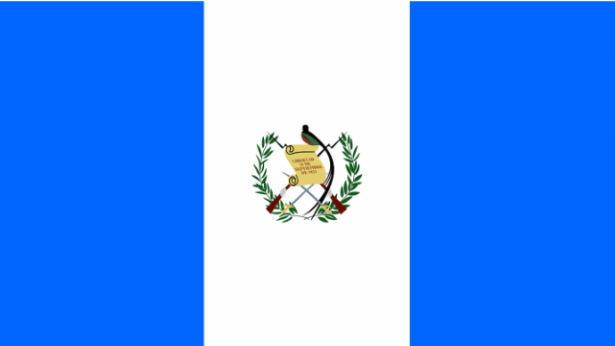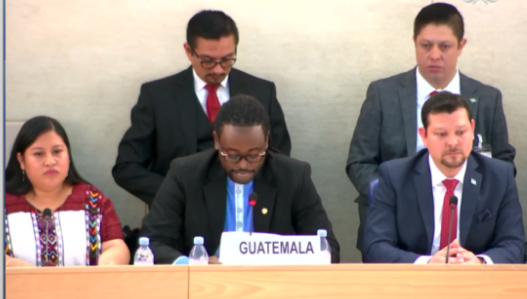UPR 4th Cycle Guatemala: High levels violence and discrimination in the country
The 42nd Session of the Universal Periodic Review
23rd January – 3rd February 2023
Guatemala Review – 4th Cycle
25th January 2023
By Bethany Morley / GICJ
Executive Summary
On the 25th of January 2023, during the 42nd session of the Universal Periodic Review (UPR), the Human Rights Council held an interactive dialogue with UN Member States on the fourth review of Guatemala.
During the interactive dialogue Guatemala was congratulated on the progress they have made thus far regarding the human rights situation in the country since their last UPR review. However, the review was characterised by reports of high levels of child labour, threats and attacks against human rights defenders and journalists, the rights (or lack thereof) of indigenous peoples, the legality of the death penalty and reports of discrimination against women, children, the LGBTQI+ community and those with disabilities.
Geneva International Centre for Justice (GICJ) commends the developments Guatemala has made thus far since the last UPR cycle and the introduction of the NAP for the prevention of violence against women. However, we remain extremely concerned with the reports of continual high levels violence and discrimination in the country. We denounce all forms of discrimination and violence pertaining to women, children, human rights defenders, and minorities. Further, we strongly deplore the legality of the death penalty. GICJ urges Guatemala to take into consideration the recommendations made by delegations to address the ongoing issues of violence.
Background
The UPR is a unique process established in 2006 (Res. 60/251) which involves a review of the human rights records of all UN Member States. The UPR is a State-driven process, under the auspices of the Human Rights Council, which provides the opportunity for each State to declare what actions they have taken to improve the human rights situations in their countries and to fulfil their human rights obligations [1]. As this is the 4th UPR for Guatemala, the country will be following up on the recommendations made in the 3rd review in accordance with resolution 5/1. Guatemala’s first, second and third UPR reviews took place in May 2008, October 2012, and November 2017, respectively.
The documents on which the reviews are based are: 1) Guatemala’s national report; 2) information contained in the reports of independent human rights experts and groups, known as the Special Procedures, human rights treaty bodies, and other UN entities; 3) information provided by other stakeholders including national human rights institutions, regional organisations, and civil society groups.
Interactive dialogue
Geneva, 24th January 2023. At the 42nd Session of the UPR, an interactive dialogue took place between delegations regarding the human rights situation in Guatemala.
delegations regarding the human rights situation in Guatemala.
During the interactive dialogue the floor was given to Mr. Ramiro Alejandro Contreras Escobar, Executive Director of the Presidential Commission for Peace and Human Rights to introduce the report. Mr. Escobar outlined how the state of Guatemala would present its main areas of progress and achievements in the cycle. He noted how the government of the Republic of Guatemala through the President Alejandro Giammattei, aimed to strengthen the institutional framework for peace and human rights in the country by introducing the Presidential Commission for Peace and Human Rights which provides advice and coordinates the actions of the executive to promote activities and mechanisms to ensure human rights are protected, amongst further achievements the country has made thus far.
The floor was then given to Mr. Carlos Arana, Presidential Commissioner to Combat Discrimination and Racism, Ms. Lilian Xinico, Ombudsperson of Indigenous Women and Mr. Oscar Perez, Vice Minister of Sustainable development of the Ministry of Energy and Mining who discussed the progress Guatemala has made to combat discrimination and racism within public institutions, mechanisms and activities to provide care for women victims of violence and the finalising of legal instruments to ensure the full participation of Indigenous peoples in decision making.
Following the opening remarks, the floor was given to the delegations for the start of the interactive dialogue where Guatemala faced critical questioning surrounding the prominence of child labour, threats and attacks against human rights defenders and journalists, the rights of indigenous peoples and reports of discrimination against women, children, the LGBTQI+ community and those with disabilities.
Minority Rights
The rights of minorities were one of the core issues considered in the review. The delegate of Ukraine recommended that Guatemala undertake special procedures to ensure the protection of vulnerable groups, particularly women, children and peoples with disabilities who are currently experiencing high levels of violence.
Gender equality and the human rights of women and girls
The delegate of Slovenia raised concerns about the rate of gender-based violence against women and children in the country. They noted that systemic impunity and failure to provide reparations to victims prevails in a high number of cases of violence towards women and children.
France and Uruguay recommended that the country pushes to effectively implement the law preventing violence against women. Further, they encouraged Guatemala to ensure perpetrators are punished and the victims receive reparations.
LGBTQI +
The delegate for the Bolivarian Republic of Venezuela, identified how LGBTQI+ peoples are victims of violence.
Indigenous Rights
Bolivarian Republic of Venezuela, amongst others, noted their concern for the multiple and ongoing human rights violations faced in the country such as the structural discrimination faced by indigenous peoples.
The Rights of a Child
Uruguay and Slovenia were amongst some of the delegates concerned about reports of child early and enforced marriage highlighting this area as one where special protective measures need to be introduced.
Threats and attacks against human rights defenders and journalists
The delegate for Switzerland recommended that Guatemala implements the previously accepted recommendations to ensure that investigations are rigorous and done swiftly on all attacks against human rights defenders and journalists. Further, to bring those responsible to justice.
Further, the France and United Kingdom recommended the country take all necessary measures to ensure freedom of the press by ceasing reprisals against civil service and justice officials for defending Human Rights, fighting corruption and investigating attacks on human rights defenders and the press.
The Death Penalty
Slovenia, ratify the second optional protocol to the international governant of civil and political rights aiming at the abolition of the death penalty.
Position of Geneva International Centre for Justice
Geneva International Centre for Justice (GICJ) commends the developments Guatemala has made thus far since the last UPR cycle and the introduction of the NAP for the prevention of violence against women. However, we remain extremely concerned with the reports of continual high levels violence and discrimination in the country. We denounce all forms of discrimination and violence pertaining to women, children, human rights defenders, and minorities. GICJ urges Guatemala to take into consideration the recommendations made by delegations to address the ongoing issues of violence.
Guatemala 4thcycle UPR childlabor 42ndsession




